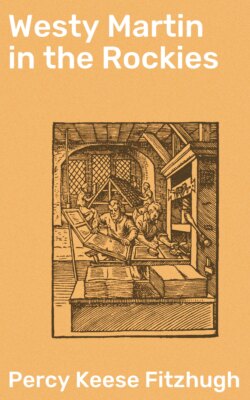Читать книгу Westy Martin in the Rockies - Percy Keese Fitzhugh - Страница 4
На сайте Литреса книга снята с продажи.
CHAPTER II
THE SPIRIT OF THE CAMP
ОглавлениеTable of Contents
When Mr. John Temple conceived the big scout community which came to be known the country over as Temple Camp, he had an inspiration that showed his fine understanding of the scout idea.
He decided to introduce into the camp something which neither the solemn woods nor the tranquil lake could give it; something which all the projected rustic architecture could not supply. And that was an atmosphere.
He was resolved that the scouts who flocked to the sequestered lakeside resort should live in proximity to a real scout, one who had lived the sort of life that is commemorated by scouting.
He would bring the prairies and the Rockies and the long, winding trails, and all the associations which cluster about Indians and grizzlies and buffaloes to Temple Camp in the romantic person of an old western scout and guide whom he had met while in the Far West on railroad business. Old Jeb Rushmore had guided Mr. Temple and a party of surveyors to a pass in the mountains following what he called a trail which was about as discernible to Mr. Temple as a trail left by an airplane. The founder of the camp had spent a night in Rushmore’s lonely cabin in Montana and had heard the voice of a grizzly in the distance.
A year later when land had been bought for the big camp in the Catskills, Mr. Temple recalled that his old guide had told him that he expected soon to give up his cabin in the Rockies and end his days at Fort Benton in his beloved Montana. “Reckon I’m gettin’ old,” he had told Mr. Temple. “That’s one thing yer can’t shoot,” he had added. Indeed old age was the only foe that had a ghost of a chance of stealing up on him.
So Mr. Temple invited Jeb Rushmore to come and live at Temple Camp and the old scout, after some hesitation, agreed to do so. He spent one night at the magnificent Temple residence in Bridgeboro where he seemed not the least bit embarrassed by the gorgeous surroundings. He smoked his pipe in Mr. Temple’s library and when that gentleman related how he had gone to Washington once to seek an audience with President Roosevelt, Jeb Rushmore casually remarked that he and Roosevelt had hunted together in the Rockies. It developed that Mr. Temple had tried to see Roosevelt and failed and that Roosevelt had gone a couple of hundred miles out of his way to get in touch with Jeb. It was not likely that Uncle Jeb would be dazzled by the formality of Mr. Temple’s household.
Uncle Jeb, as he came to be known at camp, was given the title of manager. But he had no executive duties. He was more than the camp’s manager, he was its spirit. I have seen a scout camp with a statue of an old pioneer on the camp grounds to convey the idea of scouting and outdoor life. But Uncle Jeb was the living embodiment of all these things; he wore a halo of tradition. It was a fine inspiration of Mr. Temple’s, bringing this old scout to camp.
Uncle Jeb built log cabins and made trails and instructed the scouts in pathfinding and stalking. He taught them the Indian trail marks. He would send a boy off to go where he would in the forest, give him half an hour’s head start, then take a party of boys and find him. He did this without the least trouble.
“Why didn’t yer double on yer trail?” he would demand of the astonished fugitive after running him down. “What’d I tell yer ’bout not steppin’ on no twigs ’n’ bustin’ ’em?”
“You can’t run without breaking twigs,” the embarrassed boy would protest. “And anyway, if I doubled on my trail you’d trace me anyway; so what’s the use?”
“Yer don’t hev ter tech no trees, do yer?” the old guide would say, “’n’ leave all yer duds hangin’ on ’em like a ole wash hangin’ out.”
“You can’t run in the woods without touching trees or even stepping on twigs,” the poor victim would protest. “Anyway, it’s no use trying to get away, not from you, Jiminy Christopher!”
What Uncle Jeb meant when he charged an unfortunate scout with leaving his duds hanging on trees “like a ole wash” was that the baffled youngster had left one strand of a fringe from his scout scarf on some obscure bramble bush.
“If yer decorate yer path like if a parade wuz comin’ ’tain’ no chore findin’ yer, now is it?” Uncle Jeb would ask. “Here yer scares away a turtle what was settin’ on a rock and I sees where the spot wuz he was a settin’ on. Yer ain’t reckonin’ I was blind, wuz yer?”
No, they didn’t think he was blind, they thought he had eyes all over him. It was disheartening trying to get away from Uncle Jeb.
“Now, youngster, you try agin,” the old man would say, “’n’ remember you ain’t diggin’ a cut fer a railroad ’n’ yer ain’t layin’ out no line o’ march ’s if yer wuz marchin’ through Georgie. ’N’ don’t make a noise like yer wuz shoutin’ the battle cry of freedom. ’Cause yer jes’ scare the birds ’n’ the turtles ’n’ they goes ’n’ tells on yer. Now you try once more.”
But it would be just the same thing over again.
